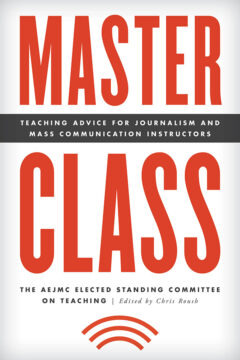
Master Class: Teaching Advice for Journalism and Mass Communication Instructors
By Chris Roush, editor. Lantham, MD: Rowman & Littlefield, 2018. 165 pages. ISBN: 978-1-5381-0053-0.
University graduate programs in journalism and mass communication should adopt a new tradition: Give a copy of Master Class to everyone along with their diploma.
The textbook, a project of the Association for Education in Journalism and Mass Communication’s (AEJMC) Elected Standing Committee on Teaching, arrived in my mailbox just days before spring semester courses began. By the weekend, I had read it and adopted a couple of new ideas.
The book, the full title of which is Master Class: Teaching Advice for Journalism and Mass Communication Instructors, is aimed at new college-level instructors, but it shouldn’t be ignored by seasoned professors. Reading the book, I more than once found myself nodding my head in agreement or feeling relief that I was not the only one who had encountered particular problems in the classroom.
As editor Chris Roush of the University of North Carolina at Chapel Hill points out in his introduction, many graduate programs now have formalized pedagogical training for students heading for a teaching career. Adjunct instructors coming fresh from the professional world, and those of us who have been teaching for some time, aren’t so fortunate. Many college instructors have learned to teach by working with professors in their graduate programs. I certainly did, wanting to emulate the best practices of those professors I adored and hoping not the make the same mistakes of the instructors who did not meet my expectations. All of us can benefit from this textbook.
Master Class crams a lot of good advice into nine chapters that essentially take the reader through various aspects of a semester. Roush contributes a chapter about writing a syllabus, which I used to fine-tune a few points in one that I was updating when the book arrived. Leslie-Jean Thornton of Arizona State University and Susan Keith of Rutgers University tackle online courses. Given that I’m teaching several this semester, I found their chapter especially interesting. Our university is in the midst of finalizing assessment plans and reports in preparation for reaccreditation, so the chapter on evaluation (written by Jennifer Jacobs Henderson and William G. Christ of Trinity University) also provided valuable tips. Other chapters emphasize planning, classroom dynamics, exercises and projects, and preparing for the next semester.
The book is an easy read, crafted with a journalistic sensibility that uses lots of examples and quotes from instructors across the country. Sidebars titled “From the Trenches” offer detailed insights from both new and experienced professors.
If a second edition is ever published, a few errors should be corrected. It’s carpal, not carpel, tunnel syndrome (p. 73). The cross-platform note-taking application is called Evernote, not Evermore (p. 128). And as any “Prairie Home Companion” fan should know, it’s Lake Wobegon, not Woebegone (p. 150). Storify, a web-based service that allowed journalists to create curated timelines of social media, gets a mention in the book. However, perhaps just as Master Class was headed to press, Storify announced in December that it is shutting down the stand-alone version.
It would have been nice to have something like Master Class the first time I faced a lecture hall full of mass communication students. The book may not have prevented me from feeling overwhelmed, but it would have offered the wisdom that could have better prepared me.
Accessed on 26 Apr 2024.
The article may be found online at https://straumanis.com/2018/master-class/.
